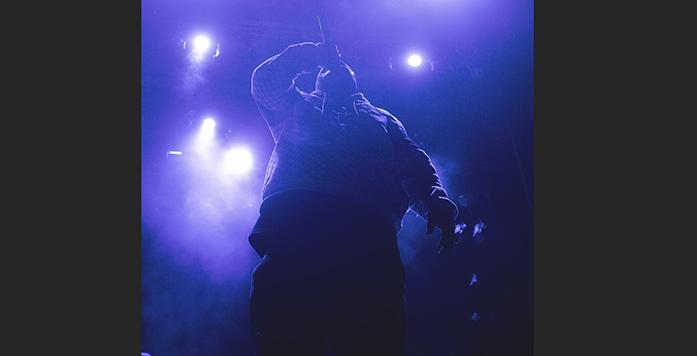By Austin Anderson
The bass thumped heavily in the rafters of the decades-old Englert Theater as people trickled in, creating a poignant juxtaposition in a venue built during the closing era of silent film.The show’s opener, AWTHNTKTS, had a magnetic stage presence. Over a musical backdrop composed mainly of blues samples, the members rapped speed-style. While their on-stage pantomimes left some to be desired, they clearly relished the chance to open for one of hip-hop’s legends and took the time to politicize the show, denouncing the rightward movement of American politics and stating that the resistance is a “revolution you can be a part of.”
Following chants of “Wu-Tang forever,” Free Murda, a part of the Wu-Tang collective, entered the show. Amateur hour was over.
“Make some noise for the Ghostace Killah,” he shouted.
Clad in a puff jacket, Ghostface sported a flow that has not declined since the release of 36 Chambers.
The audience had gotten what they came for, the ultimate showman. Although his critical reputation has declined in recent years, his show was just as entertaining. From the first few bars of “Ice Cream” onward, the audience engagement was overwhelming, with each hook being echoed by the patrons.
The DJ made use of the heavy drumbeat that characterizes the Wu-Tang sound. The retro reminiscence continued with the excellent performances of several songs off of *36 Chambers*, complete with the iconic bar, “Jacques Costeau could never get this low.”
Despite the vast changes in his three decades of fame, the vigor and stage presence of Ghostface remain constant.
First coming to fame as a member of famed New York City supergroup Wu-Tang Clan, Ghostface Killah played an integral role in the creation of the group’s magnum opus Enter the Wu-Tang (36 Chambers) in 1993. Alongside reunion efforts with the group, Ghostface has had major collaborative success working with group members, most notably on Raekwon’s 1994 debut Only Built 4 Cuban Linx.
However, Ghostface has created a solo career not overshadowed by his time in Wu-Tang, showing the ability to remain in the public spotlight for the better part of three decades. This is in part due to his part in public feuds with actors as diverse as members of 50 Cent’s crew G-Unit and controversial pharmaceutical magnate Martin Shkreli, with whom Ghostface has feuded over the sale of the Wu-Tang album Once Upon A Time In Shaolin.
Taking foul with Shkreli’s price increase of the essential AIDS/cancer medicine Daraprim and its implications for lower-income people faced with both diseases, Ghostface was quoted calling Shkreli a killer, saying “You a real killer man, you’re a real killer. But you’re a soft killer,” per a CNBC article.
His outspoken public persona aside, Ghostface has through his crime-noir rapping achieved massive solo success, with three solo albums: Ironman (1996), Supreme Clientele (2000), and Fishscale (2006) widely considered to be essential part of the canon of classic hip hop.
Ghostface’s work has received widespread critical acclaim, even receiving the begrudging respect of Robert Christgau, the hard-nosed longtime critic for the *Village Voice*’s “Consumer Guide.” Despite having moral reservations about the artist’s content, Christgau gave Ghostface a majority of “A” ratings on albums for the better part of a decade.
Christgau has repeatedly written about the documentary nature of Ghostface’s albums: “The most street of the Clan — not comic like Ol’ Dirty Bastard or mack like Method Man, not deep like Raekwon or Genius, either,” Christgau wrote of Ghostface in his 1996 début Ironman, “In a word, gangsta — East Coast-style, reflective and observant, only he doesn’t vow to go straight all the time. By his own account, he’s done a lot of bad things.”
Despite high praise for Ironman and Supreme Clientelle, it is with 2006’s Fishscale that Christgau’s praise reaches its highest levels.
“With the crack trade making its hip-hop comeback, Ghost fashions a trend record that ranks with any Biggie or Wu CD. His high wail renders extreme anxiety beautiful. And before the music settles into a powerfully souled and sampled Clan-type groove, its screeching intensity has a Nation of Millions feel.”









